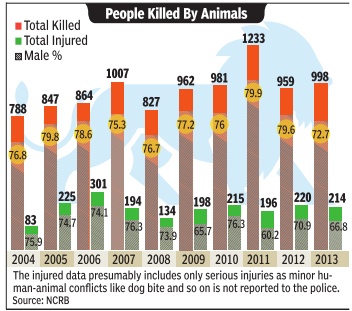Animals vs. humans: India
This is a collection of articles archived for the excellence of their content. |

Cruelty to animals: 2013-15
The Times of India, May 15 2016

Animal cruelty cases down by 64% in 8 states
Atul Thakur & Jayashree Nandi
Released data in Parliament shows that there has been a major decline in cases registered under the Prevention of Cruelty to Animals Act. Does that mean Indians are treating animals more kindly than they used to? Not really. In eight states that provided data to the environment ministry , cases dropped from over 14,000 in 2013-14 to less than 5,000 in 2014-15.But according to animal welfare experts, cases under the law mostly deal with transportation of animals. Hence, these numbers point at a significant drop in animals being ferried from one place to another.
“More than 80% of cruelty cases registered are cow transportation cases. This also means cruelty against other animals is highly under-reported,“ says N G Jayasimha, member of the Animal Welfare Board of India (AWBI).
Incidentally , the decline coincides with BJP's electoral wins -the ban on cow slaughter in various states and rising incidents of mob violence against people transporting animals.
In a country that boasts of the world's largest cattle population, transporting animals is a normal activity that is not always linked to slaughter or illegal trade.
While cases declined in every state, Uttar Pradesh witnessed the highest decrease in absolute terms -from 5,012 cases in 2013-14 to 1,139 in 2014-15 -followed by Delhi, Haryana, Odisha and Maharashtra.
Convictions fell dramatically too -from over 20,000 in 2013-14 to 3,801 the next year. Sources in Delhi's Society for Prevention of Cruelty to Animals (SPCA) said the decline in the Capital is also linked to the Supreme Court's imposition of environment cess that has reduced the number of trucks entering the city.
However, Maneka Gandhi, Union minister for women and child development and animal rights activist, insists cases haven't reduced. “They may have increased a hundred fold. They are just not getting reported,“ she said.
Some experts agree that there could be under-report ing. Jayasimha said, “Since the new government has come there is an over-emphasis on cow protection. The police tends to associate animal rights with one particular religion now and avoids filing cases fearing a law and order situation. Plus, the penalty for cruelty cases is so low that there is no motivation to register cases.“
Activists say cruelty against animals has certainly not decreased, and getting cases registered continues to be difficult. “In Rajasthan, Orissa and Haryana, people who stop cow slaughter are routinely abducted and beaten up,“ said Gauri Maulekhi, member secretary , People for Animals (PFA). “Cow and camel slaughter bans in Haryana, Maharashtra and Rajasthan ring hollow since nothing is done to shelter old and unproductive animals, eventually leading to their slaughter in other states.“
Animal welfare experts also question the government's sincerity on cow wel fare, pointing out that funding to goshalas has been drastically cut during the Modi-regime.
The AWBI which has 1800 goshalas under it used to receive Rs 23 crore earlier but got only Rs 9 crore this time, according to R M Kharb, chairman, AWBI.
Meanwhile, the leather industry is taking a hit. Ashok Shankar Gaikwad, president of the Kolhapur Charmodhyog Samuha, said the decrease in animal transportation because of the hardline approach against cow slaughter has affected transport of other bovine animals, including buffalo.
Its impact is visible on the Kolhapur leather industry where raw material supply has declined over the past year, forcing skilled leather workers to look for other career options.
“While the government talks about `Make in India', its policies have ruined the established brand of Kolhapur footwear,“ he said.